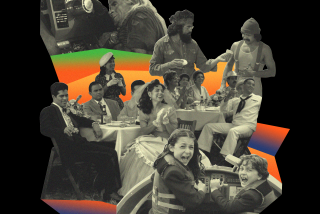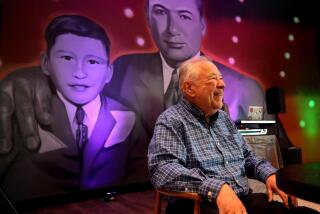‘Selena’ Paves Way for Chavez
Cesar Chavez, who organized the United Farm Workers union, staged a massive grape boycott in the late 1960s to dramatize the plight of America’s poor farmhands, and later became a Gandhi-like leader to urban Mexican-Americans, was found dead Friday in San Luis, Ariz., police said. He was 66.
--L.A. Times, April 24, 1993
Perhaps now they can bring the story to the big screen. Perhaps now, say Moctesuma Esparza and Bob Katz, Hollywood studios are slowly realizing that films featuring Latinos can become box-office attractions throughout the land--just as the two producers’ newly released movie “Selena” has in recent days.
And the story Esparza and Katz have long wanted to tell is the one the late United Farm Workers leader Cesar Chavez refused to grant them over the years--the story of Cesar Chavez.
Today, Esparza and Katz, buoyed by the strong showing of their “Selena,” which has taken in $21.7 million in ticket sales in its first 10 days of release, are developing a Luis Valdez screenplay about Chavez that has been commissioned by Warner Bros.
“For maybe 15 years prior to [Chavez’s] death, Luis Valdez was trying to get him to agree to make a movie,” Esparza said. “Luis and I would talk about it and say, ‘Let’s go see Cesar and make this movie,’ and Cesar would certainly entertain us and talk to us about it. But he would basically say, ‘Not yet. Not now.’
“Cesar never really wanted to be the focus of the movie,” Esparza added. “He had no desire to be the icon. He did not want the movement to rest on his shoulders.”
“He was a very shy man, in the respect that he didn’t want it to be about him,” Katz said. “He wanted it to be about the struggle, the battles.”
Three months before he died, however, Chavez suddenly and inexplicably had a change of heart.
“It was at a banquet in Southern California honoring the 30th anniversary of the [United Farm Workers] union,” Esparza recalled. “It was at a hall in South-Central [Los Angeles]. Luis was there. We said to Cesar, ‘It’s time. Let’s do it.’ And, in the most quiet, gentle way, just as he had been saying no to us all those years, he said, ‘Yes.’ He said, ‘Let’s get together and get the movie going.’ And the next thing you know, he died.”
The producers were invited to film Chavez’s funeral in Delano, Calif., which was attended by 35,000 mourners.
“This is a man who witnessed and experienced a tremendous amount of adversity and violence in his life,” Esparza recalled. “There was a critical moment in 1968 when people were being killed, storefronts and warehouses were being burned to the ground, where the potential for violence in the San Joaquin Valley to just erupt in the most terrible way was so palpable. Cesar felt he was willing to put his own life on the line for the values of nonviolence.”
(Meanwhile, with the fourth anniversary of Chavez’s death approaching, PBS on April 16 will air Rick Tejada-Flores and Ray Telles’ documentary titled “The Fight in the Fields: Cesar Chavez and the Farmworkers’ Struggle.”)
The Chavez film is especially personal to Esparza. A product of East Los Angeles, he once marched as a high school junior with Chavez from the fields of Delano to the State Capitol in Sacramento and later was arrested three times for taking part in protests on behalf of Chicano rights.
“I was facing 45 years [in prison],” Esparza said.
Esparza’s first arrest was for organizing a protest of East Los Angeles high schools, which spread throughout the city.
“We were protesting the extremely high dropout rate of Latinos--50%--the poor educational standards, the lack of Latino teachers, principals and counselors, the lack of teaching of our own American history contributions we had made to this country and the general pushing of Latino students into trade-technical subjects and away from academics,” he said.
With the aid of the American Civil Liberties Union and others, Esparza said, the charges were thrown out. But he was arrested two more times--including a secret grand jury indictment--for disrupting a speech by then-Gov. Ronald Reagan at the Biltmore Hotel. Esparza, a founder of the Brown Berets, was acquitted.
Now 48, Esparza took many zigs and zags on his journey from protester to Hollywood filmmaker--he received a scholarship at UCLA, attended film school and a year after his acquittal, received a White House security pass. In 1972, he became co-chair of the California delegation to Miami for George McGovern’s presidential campaign.
In 1984, Esparza was developing a project on South Africa about a white doctor who was arrested by the then-apartheid regime for setting up a clinic in a black township. The doctor was the first white to die mysteriously in prison, Esparza said. Another filmmaker happened to mention that he had a “long lost cousin” who could raise money for the project. That person was Bob Katz.
A former Marine, the now 54-year-old Katz had spent years in Africa and both he and Esparza found they shared a mutual interest in documentaries.
Today, Esparza/Katz Productions has created a niche in Hollywood, often telling Latino or historical stories including “Gettysburg,” “The Cisco Kid” and “Avenging Angels” for TNT; the musical “Caliente y Picante” for HBO; and feature films “The Ballad of Gregorio Cortez” and “The Milagro Beanfield War.” They currently have a $20-million miniseries for TNT called “Rough Riders,” which John Milius directed.
This fall, Sony plans to release their film “Lorca,” the story of poet Federico Garcia Lorca, who was reportedly killed by Falangist soldiers in the opening days of the Spanish Civil War.
Their success with “Selena” has been gratifying, the producers said, because no one predicted the film--which cost $23 million--would open as well as it did. The producers said Hollywood pollsters predicted the movie would open in the $5-million to $7-million range, but it took in $11.6 million--with 85% of the audience Latino.
“We weren’t surprised by the opening, given the extraordinary fan support that we had,” Esparza said. “When we had our open casting call, we had over 20,000 people show up in Miami, Chicago, San Antonio and Los Angeles. . . . And when we had the re-creation of the Houston Astrodome concert, Selena’s last major concert, we had 34,000 people show up.”
The film was screened for predominantly white and Latino audiences, and the excellent and good ratings were 91% and 92%, respectively.
“Warner Bros. was shocked by that,” Katz said. “They didn’t know where this was gonna go. They just knew that they smelled it. That’s why they accelerated post [production] and why they chose Easter [to release it].”
Esparza and Katz believe studios will now embrace Latino films. “I can tell you now that half of the [executives at] studios are probably sitting around and saying, ‘What are the Latino projects we have?’ ” Katz remarked.
For Esparza and Katz, the epic saga of Chavez would fit perfectly into their filmmaking careers, which have focused largely on biographies that have a social or political impact.
But the producers say they don’t want to make a Chavez movie in order to send any political messages. Katz says they simply want to tell “people stories.”
Stressing this point, Esparza said he harbors no animosity for America because of his past arrests.
“This is a great country,” he said. “If I’d have done what I’d done in Mexico, they’d have killed me.”
More to Read
Only good movies
Get the Indie Focus newsletter, Mark Olsen's weekly guide to the world of cinema.
You may occasionally receive promotional content from the Los Angeles Times.










